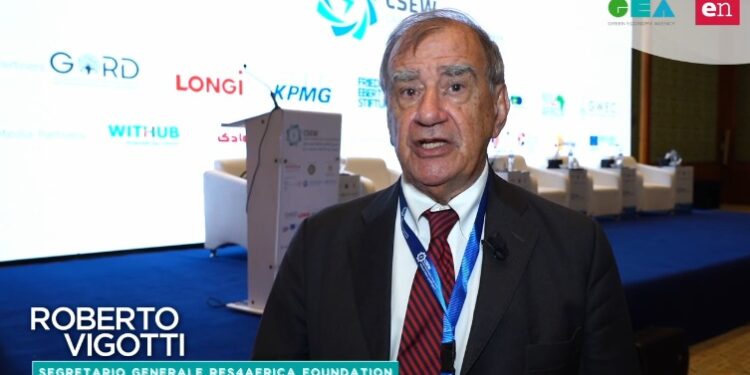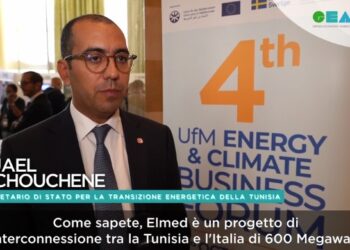Cairo – “Green hydrogen is one of the solutions proposed by energy companies to replace uses that are unlikely to be replaced by electricity. We talk about the creation of ammonia or heavy transport, but in perspective, I think we will only have 15 per cent green hydrogen at the end of 2050. If it has to be green, it also means building lots of solar and wind power plants to produce it, and today, the costs are a bit higher, but I am confident that green hydrogen will be a partial reality in the next ten years. Especially African countries want to export it to Europe, so we are confident it is a good solution. However, it is not the solution for either Europe or Africa; it is a partial solution” for decarbonization and electrification.” So said Roberto Vigotti, secretary-general of the Res4Africa Foundation, on the sidelines of CSEW, the Cairo Sustainable Energy Week underway in Cairo, Egypt’s capital.
“Unfortunately, renewables in Africa are still far behind despite being the continent with the most solar and wind. So much renewable energy is put in every year, particularly in America, Europe and China—in Africa, only 2 per cent. The reason is clear: there is resistance, and there are regulations. So Africa should mainly increase private investment because it’s not that the African public ones have a lot of input, but if an Enel, a Terna, a Cesium could invest… Often, it’s not possible to make private investments because their policy system still blocks them. So, Africa is still unable to store renewable energy, except hydro. So, we have to ensure that the systemic approach, renewables plus storage, becomes a must. Today, I have to say that in this conference, many countries have talked about smart grids, that is, grids that have digital sensors that can do storage,” Vigotti adds.
“Choices are made together, and in Europe, we are fortunate to have a system of countries that share choices such as electrification, which, however, is not a short-term thing; it is something that goes with its time and to see the benefits of massive electrification, as has happened in Europe, but in Africa and other countries, is wrong because, in the short term, it is not done. You have to have patience for 20 to 30 years, also because the benefits of giving electricity to Africans means allowing young Africans to become self-reliant,” he added. “Imagine the kids in China, Thailand, Brazil… In sub-Saharan Africa, 30 per cent have electricity, and 70 per cent have cell phones. You have to allow them to become electricity savvy and have patience… We, as Res4Africa, together with the Italian champions, can pass on the confidence to them.”
In general, “Africa could be energy self-sufficient, unfortunately recent events have caused the Europeans to keep looking to Africa for a somewhat colonial aspect to take their gas, their coal. Surely, Africans will be capable in the next 20 years of autonomy and even export electricity from renewable sources. There is a delay due to the fact that the current approach, in the short term, is to go to some countries and take the gas that we have lacked since the outbreak of war in Ukraine. Together, however, Italy is doing a very good job with the Mattei Plan, we are committed to build soon in Morocco an intercontinental center on renewable energy and hydrogen. We are happy that Italy has chosen to train Africans. As they say, it is better to teach them to fish than to give them fish.”
English version by the Translation Service of Withub






![Julian Assange (a destra) in audizione all'Assemblea parlamentare del Consiglio d'Europa [Strasburgo, 1 ottobre 2024]](https://www.eunews.it/wp-content/uploads/2024/10/assange-75x75.png)


![Una donna controlla le informazioni sul cibo specificate sulla confezione [foto: archivio]](https://www.eunews.it/wp-content/uploads/2014/12/Etichette-alimentari.jpg)

